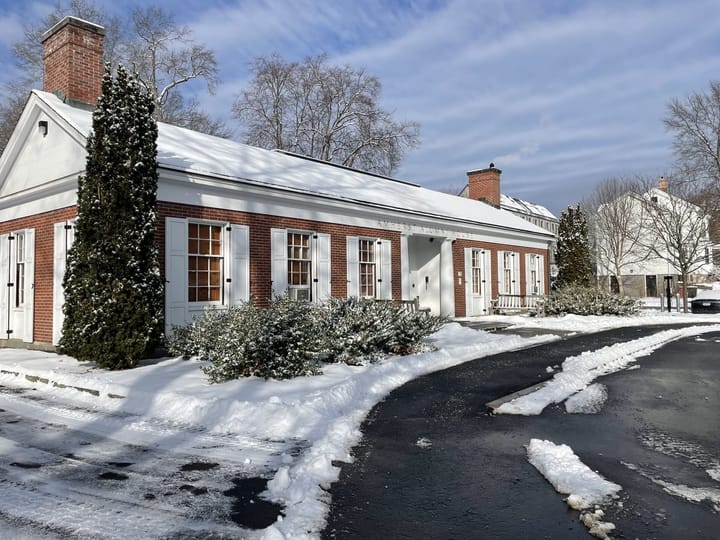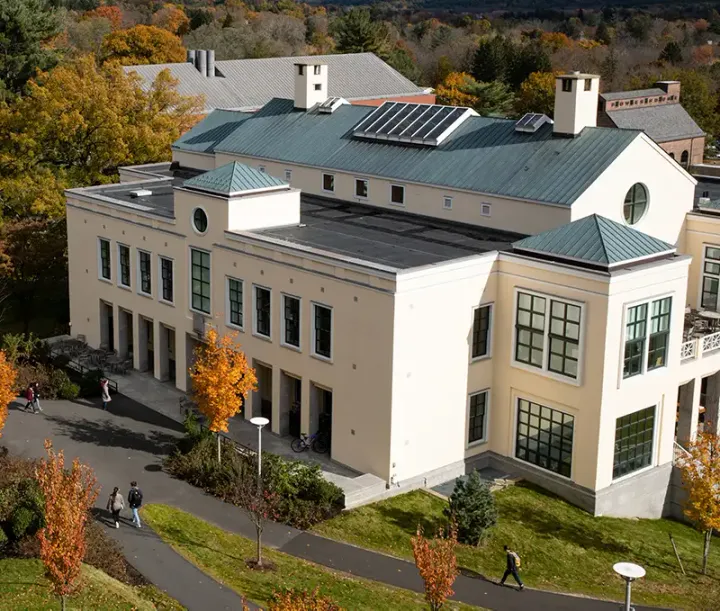London '74 leaps into limelight
Amherst antics
During London’s time at Amherst, the issue of coeducation was on everyone’s mind. His graduating class served as a driving force to promote the admittance of women to the College. Prior to this move, small numbers of women were merely guests on the campus. “There was one floor of South [College] that belonged to women-they were ‘visitors’ from other colleges,” said London.
Although there was a formal exchange program that allowed this number of women to attend, Amherst did not admit its first class with women until 1976. “I’m sure every generation thinks its causes are worthy, and I’m certain that ours were,” said London. “First, Vietnam, then coeducation. It was the right thing for the school; many dinosaurs opposed it, but it was an idea whose time had come.”
As managing features editor for The Student, London frequently wrote pieces encouraging this transition. “There was something about it in virtually every issue,” he said. “The Amherst Student was probably the most significant driving force behind promoting coeducation.”
“I value both my Amherst education and friendships within the Amherst community,” London said. “Virtually all the good people I know and cool things I have done can be traced back to one Amherst connection or another.” London also went through the joys and trials of writing a thesis, an experience that unites many Amherst seniors of all generations.
The project was an overwhelmingly positive experience for London. The College gave him a stipend to use for the travel that was necessary for his thesis, which was titled, “Red, White, Blue and Pink: Pornography in Small-town America.” Through travel to Wells River, Vermont and Albany, Georgia, London composed his thesis of how communities in Albany, Georgia reacted to the book “Go Ask Alice” and to the movie “Carnal Knowledge” and reflected their overall world view of issues such as religion, racism and the economy.
London majored in American Studies while at Amherst and sang the praises of Professor of American Studies Leo Marx. “He is one of the finest professors Amherst ever had,” he said. “I ate dinner at his house, [and] I hung out with him. I was part of the Marx family.” London, a true advocate of the liberal arts education, based his academic pursuits on their intrinsic value and interest rather than their value for a professional career.
His academic pursuits were never career-oriented; London took those courses which he thought would most challenge him to think. “Education for education’s sake-it’s a great luxury that Amherst provides,” he said.
Been around the world
London said that his time on The Student staff absolutely influenced his desire to write later in life. Some of his fellow editors also went on to become prominent journalists who have taken their Student experiences and transformed them into careers.
“My year of The Student was a great crop of writers: Robert Steinbrook was the editor-in-chief, and is now the assistant editor of The New England Journal of Medicine; Cullen Murphy, an Amherst trustee, was our managing editor and is now managing editor of The Atlantic; Jim Warren, my co-features editor, is the Washington bureau chief of the Chicago Tribune and a regular on CNN; and the managing news editor was Robert McCartney, former foreign editor of The Washington Post and now the editor of the International Herald Tribune,” said London.
“My first real job was as a newspaper reporter,” said London. “I worked in Redbank, New Jersey, for the father of Blair and Brooke Kamin, of whom both are Amherst grads. Blair just won the Pulitzer Prize two years ago.” After working briefly with The Philadelphia Bulletin, London then moved to Washington, D.C. to manage the campaign of politician Joe Tydings. “He used to be a senator from Maryland, and he tried to make a comeback-it didn’t work,” he said.
After the campaign folded, London stayed in Washington to attend law school at George Washington University. During his time there, London was employed by a local law firm, where he said he “worked for a year and then took two consecutive six-month leaves of absence to travel to the Amazon.”
This change of scene is where London would pen the first of his two non-fiction books with friend Brian Kelly, now the managing editor of U.S. News and World Report.
After his year-long trip to the Amazon, Harcourt, Brace and Jovanovich released London’s non-fiction book, aptly titled “Amazon.” “It’s first-hand reporting of the imminent conflict between the development and destruction of the rainforest,” explained London.
This particular issue has always interested London. His proficiency in Spanish and Portuguese helped him dive into this issue, especially since he has long been fluent in the former. “I worked summers in Colombia and Spain during high school, but I learned Portuguese specifically for the Amazon,” London said. His vast knowledge of the rainforest resulted in a masterful work that was met with critical success. “I was on the Merv Griffin Show and the Larry King radio show, back when he had one,” he said.
With the noteworthy accomplishment of Amazon under his belt, London returned to law for a short time; but anxious to return to writing, traveled to Asia several times over two years, after which time he and Kelly wrote their second book, “The Four Little Dragons,” released by Simon and Schuster.
This second book attempted to discuss the cultures of southeastern Asian nations from an American perspective. London, however, is quick to discount the work. “It had some useful insights, but on the whole it lacked the substance we wanted it to have,” he explained. London was especially disappointed in the end result of their work in comparison to the first. “It’s a mediocre book,” he said. “With ‘Amazon,’ we knew everything there was to know-it was a subject you could wrap your arms around. But Asia’s been around longer than we have [and] there’s just too much to grasp in too short a time.”
Mark “the Shark”
As a follow-up to these achievements, London went on to start a small law firm, Mark London and Associates. Not long after, the firm combined with Chris Mead, author of an acclaimed biography of Joe Lewis, to make London and Mead in 1994. In his law career, London is known to his colleagues as Mark “the Shark.” The nickname was given to him by a client because, as London explains, “You don’t want your lawyer to be called Mark ‘the Flounder.'”
Representing a variety of famous names in the media, one could call London a lawyer to the stars. This peripheral fame is not his goal, however. “I basically handle cases that have a meaningful impact on people’s lives,” he said. “I am a trial lawyer who takes on civil cases all over the country.” Among the noteworthy matters London has handled is his negotiation of Paula Barbieri’s book on her life with O.J. Simpson. He also represented Riddick Bowe when he was heavyweight champion of the world. But London said, “Just as often, I represent people that don’t end up in anybody’s newspaper.”
“Trial lawyers are modern-day gunslingers. We’re no prettier or more subtle, and justice can be just as rough,” he said.
Whether recording events for The Student, composing a book or writing up a case, a vast portion of London’s work has involved writing in some way. The recording of history in its different forms has been of special interest for the author and lawyer. “Preparing a case is reconstructing history in the order in which it is most advantageous for a client,” London said. “Writing a non-fiction book is retelling history as it happened, and hoping it’s interesting.”
What does it take to be successful in your passion, whether it be law, writing or otherwise? “Follow your heart,” said London, who has consistently acted on his interests, taking advantage of a classic liberal arts education and using law later on in his life to effect change in people’s lives. “When it’s time to grow up a little more, you can take care of your pocketbook, but if you don’t get to do things that you want to when you’re young, you won’t get the chance to any other time.”
Now, with a wife and three young children, London is exactly where he wants to be in life. “The word ‘responsibility’ creeps
into your life,” he said. “That’s why I did what I did then, because now I have three kids and I want to spend time hanging out with them.”





Comments ()